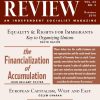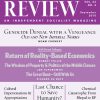Capitalism and the Curse of Energy Efficiency
The curse of energy efficiency, better known as the Jevons Paradox—the idea that increased energy (and material-resource) efficiency leads not to conservation but increased use—was first raised by William Stanley Jevons in the nineteenth century. Although forgotten for most of the twentieth century, the Jevons Paradox has been rediscovered in recent decades and stands squarely at the center of today’s environmental dispute | more…
The Humanization of the Cosmos—To What End?
Society is increasingly humanizing the cosmos. Satellites have for some time been central to the flow of information, to surveillance, and to the conduct of warfare. As these examples suggest, however, the humanization of the cosmos is primarily benefiting the powerful. These include major economic and military institutions. Furthermore, the forthcoming commodification and colonization of the cosmos is again likely to enhance the interests of the powerful, the major aerospace companies in particular. The time has come to consider alternative forms of cosmic humanization. These would enhance the prospects of the socially marginalized. They would also allow humanity to develop a better understanding of the cosmos and our relationship to it | more…
Mexico: “Failed States,” New Wars, Resistance
A social volcano is bubbling in Mexico. Nearly half the country’s eligible voters showed their disgust with the country’s political parties by staying away from the polls in the off-year elections of July 2010. All the major political parties have become neoliberal and corrupt. Broad-based social movements are resisting a right-wing offensive, which, building on twenty-eight years of neoliberal economic policies, has led to the country’s increasing militarization. Following the 2006 fraudulent election of Felipe Calderón,1 a reign of terror was unleashed by means of his unconstitutional, self-declared “war” ostensibly against drug cartels involved in bloody internecine strife | more…
Dreams of Revolution: Oklahoma, 1917
In August 1917, tenant farmers and sharecroppers in several eastern and southern Oklahoma counties took up arms to overthrow the United States government, to stop military conscription and U.S. entry into the war in Europe. Renegade Socialists, organized in their own “Working Class Union” (WCU), white, black, and Indian, they believed that millions of armed working people across the country would march with them to take Washington | more…
The Guilt of Capitalism
Though it is neither written nor marketed as such, Who Owns the Sun? by researcher/activists Daniel Berman and John O’Connor, is a devastating indictment of capitalism. As it has developed in the last two centuries, this system is an enormous user of energy, most of it derived from the burning of fossil fuels (coal, oil, natural gas). An additional—and in some parts of the world increasing—source is nuclear fission. Both of these forms of energy are dangerous and environmentally destructive to life on the planet. Burning fossil fuels generates almost all of the greenhouse gasses that have already begun to change the planet’s climate and, if continued at anywhere near the present rates, will trigger a chain reaction of lethal disasters, not in some vaguely distant future but in the next century or so—historically a relatively short span of time. Nuclear fission leaves a legacy of radioactive waste that cannot now, or perhaps ever, be safely disposed of. Clearly if humanity, not to speak of other forms of life, is to have a future, nothing could be more important than phasing out these sources of energy. So much, I believe, is what can be appropriately called ecological common sense | more…

October 2010 (Volume 62, Number 5)
To understand the disaster that is present-day economics, it is crucial to recognize that we are living today, not only in the deepest economic crisis/stagnation since the Great Depression, but also—as Paul Krugman declared in his New York Times blog on January 27, 2009—in “A Dark Age of Macroeconomics,” in which the central discoveries of the 1930s have been forgotten or discarded. “What made the Dark Ages dark,” Krugman wrote, “was the fact that so much knowledge had been lost, that so much known to the Greeks and Romans had been forgotten by the barbarian kingdoms that followed.” The critical knowledge lost that gave rise to the new Dark Age in Macroeconomics, he claimed, was none other than the Keynesian Revolution centered on the critique of Say’s Law, or the notion that supply creates its own demand. In the context of arguing against government deficit spending, leading economists at the University of Chicago, the bastion of reaction in economics, have reverted to a “pure Say’s Law, pure ‘Treasury view’” by insisting that increased savings automatically lead to increased investment, while government borrowing invariably “crowds out” investment | more…
The Financialization of Accumulation
In 1997, in his last published article, Paul Sweezy referred to “the financialization of the capital accumulation process” as one of the three main economic tendencies at the turn of the century (the other two were the growth of monopoly power and stagnation). Those familiar with economic theory will realize that the phrase was meant to be paradoxical. All traditions of economics, to varying degrees, have sought to separate out analytically the role of finance from the “real economy.” Accumulation is conceived as real capital formation, which increases overall economic output, as opposed to the appreciation of financial assets, which increases wealth claims but not output. In highlighting the financialization of accumulation, Sweezy was therefore pointing to what can be regarded as “the enigma of capital” in our time | more…
The Crisis of Capitalism in Europe, West and East
There are three dimensions to the current, unprecedented global crisis of capitalism: economic, ecological, and political.
Let us look first at the economic dimension, which will be our main concern in this article. Capitalism is facing a major realization crisis—an inability to sell the output produced, i.e., to realize, in the form of profits, the surplus value extracted from workers’ labor. Neoliberalism can be viewed as an attempt initially to solve the stagflation crisis of the 1970s by abandoning the “Keynesian consensus” of the “golden age” of capitalism (relatively high social welfare spending, strong unions, and labor-management cooperation), via an attack on labor. It succeeded, in that profit rates eventually recovered in the major capitalist economies by the 1990s | more…
Equality and Rights for Immigrants—the Key to Organizing Unions
Organizing immigrant communities is not a matter of taking pity on the downtrodden. It is a matter of understanding what is necessary for the survival of our communities, of our labor movement. If we are serious in wanting to build political power, then we must incorporate migrant workers, fight for their rights, and make the movement for social justice one that belongs to all of us, documented and undocumented. | more…
Two Poems
When Marilyn Buck died last August 3, she had lived outside prison, on parole, for only twenty days. At age sixty-two, she had spent her last twenty-five years in various maximum security prisons. Before that, she lived years underground, supporting and taking part in actions with the Black Panther Party and later, the Black Liberation Army. Marilyn was a white woman who carried a great deal of pain, most of which came from her unflinching acknowledgement of the centuries of untold inequities suffered by African Americans and other people of color at the hands of “freedom-loving” white America | more…
The Great Financial Crisis—Three Years On
The Great Financial Crisis began in the summer of 2007 and three years later, despite a putative “recovery,” it is still having profound effects in the United States, Europe, and in much of the world. Austerity is being forced on working people in many countries. Matters are especially difficult in Greece, a country that is being compelled by the demands of bankers, including the International Monetary Fund, to squeeze its workers in return for loans from abroad to help pay down government debts. Official unemployment in the United States is still around 10 percent, and real unemployment is much higher. An unprecedented 44 percent of the officially unemployed have been without work for over six months. A record number of people are receiving government food assistance as well as meals and groceries from charities. Many U.S. states and cities, facing large shortfalls in their budgets due to falling tax revenues, are cutting jobs and reducing funding for schools and social programs | more…
Red Cop in Red China
The books reviewed here are Qiu Xiaolong, Death of a Red Heroine (2000), 464 pages, $14.00; A Loyal Character Dancer (2002), 360 pages, $14.00; When Red Is Black (2004), 320 pages, $13.00, all published in New York by Soho Crime; and A Case of Two Cities (2006), 320 pages, $13.95; Red Mandarin Dress (2007), 320 pages, $13.95; The Mao Case (2009), 304 pages, $13.99, all published in New York by Minotaur Books.
Qiu Xiaolong—the prolific Chinese novelist born 1953 in Shanghai and a resident of the United States since 1988—has made a fetish of the word and the color red, not surprisingly, since he writes about Red China. Three of his innovative novels include red in the title: Death of a Red Heroine (2000), When Red Is Black (2004), and Red Mandarin Dress (2007). In all three of these books, the main character is a sensitive, poetry loving, yet tough-minded police inspector who works for the Shanghai Police Bureau; he’s on the city payroll and doesn’t work as a free-lance private eye for hire | more…

September 2010 (Volume 62, Number 4)
During the period stretching from the 1970s through the 1990s, Monthly Review, under the editorship of Harry Magdoff and Paul Sweezy, stood apart in its analysis of the tendency to economic stagnation in advanced capitalism and its view that the economic slowdown beginning in the 1970s was a manifestation of this secular tendency. The financial explosion that also emerged in these years was seen as an attempt by the system to stave off stagnation by means of credit-debt expansion, but at the cost of increasing financial fragility | more…